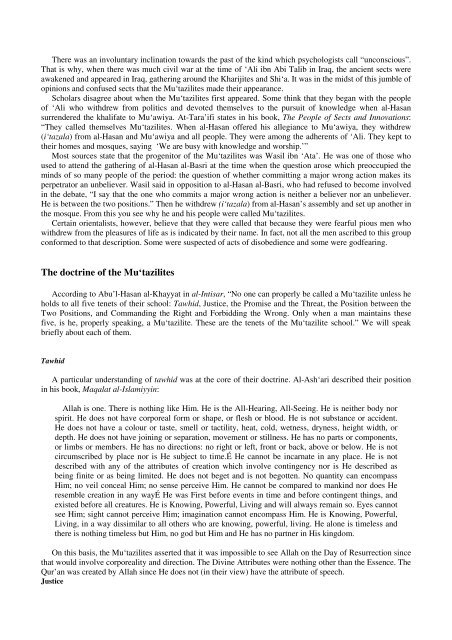Create successful ePaper yourself
Turn your PDF publications into a flip-book with our unique Google optimized e-Paper software.
There was an involuntary inclination towards the past of the kind which psychologists call “unconscious”.<br />
That is why, when there was much civil war at the time of ‘Ali ibn Abi Talib in Iraq, the ancient sects were<br />
awakened <strong>and</strong> appeared in Iraq, gathering around the Kharijites <strong>and</strong> Shi‘a. It was in the midst of this jumble of<br />
opinions <strong>and</strong> confused sects that the Mu‘tazilites made their appearance.<br />
Scholars disagree about when the Mu‘tazilites first appeared. Some think that they began with the people<br />
of ‘Ali who withdrew from politics <strong>and</strong> devoted themselves to the pursuit of knowledge when al-Hasan<br />
surrendered the khalifate to Mu‘awiya. At-Tara’ifi states in his book, The People of Sects <strong>and</strong> Innovations:<br />
“They called themselves Mu‘tazilites. When al-Hasan offered his allegiance to Mu‘awiya, they withdrew<br />
(i‘tazala) from al-Hasan <strong>and</strong> Mu‘awiya <strong>and</strong> all people. They were among the adherents of ‘Ali. They kept to<br />
their homes <strong>and</strong> mosques, saying ‘We are busy with knowledge <strong>and</strong> worship.’”<br />
Most sources state that the progenitor of the Mu‘tazilites was Wasil ibn ‘Ata’. He was one of those who<br />
used to attend the gathering of al-Hasan al-Basri at the time when the question arose which preoccupied the<br />
minds of so many people of the period: the question of whether committing a major wrong action makes its<br />
perpetrator an unbeliever. Wasil said in opposition to al-Hasan al-Basri, who had refused to become involved<br />
in the debate, “I say that the one who commits a major wrong action is neither a believer nor an unbeliever.<br />
He is between the two positions.” Then he withdrew (i‘tazala) from al-Hasan’s assembly <strong>and</strong> set up another in<br />
the mosque. From this you see why he <strong>and</strong> his people were called Mu‘tazilites.<br />
Certain orientalists, however, believe that they were called that because they were fearful pious men who<br />
withdrew from the pleasures of life as is indicated by their name. In fact, not all the men ascribed to this group<br />
conformed to that description. Some were suspected of acts of disobedience <strong>and</strong> some were godfearing.<br />
The doctrine of the Mu‘tazilites<br />
According to <strong>Abu</strong>’l-Hasan al-Khayyat in al-Intisar, “No one can properly be called a Mu‘tazilite unless he<br />
holds to all five tenets of their school: Tawhid, Justice, the Promise <strong>and</strong> the Threat, the Position between the<br />
Two Positions, <strong>and</strong> Comm<strong>and</strong>ing the Right <strong>and</strong> Forbidding the Wrong. Only when a man maintains these<br />
five, is he, properly speaking, a Mu‘tazilite. These are the tenets of the Mu‘tazilite school.” We will speak<br />
briefly about each of them.<br />
Tawhid<br />
A particular underst<strong>and</strong>ing of tawhid was at the core of their doctrine. Al-Ash‘ari described their position<br />
in his book, Maqalat al-Islamiyyin:<br />
Allah is one. There is nothing like Him. He is the All-Hearing, All-Seeing. He is neither body nor<br />
spirit. He does not have corporeal form or shape, or flesh or blood. He is not substance or accident.<br />
He does not have a colour or taste, smell or tactility, heat, cold, wetness, dryness, height width, or<br />
depth. He does not have joining or separation, movement or stillness. He has no parts or components,<br />
or limbs or members. He has no directions: no right or left, front or back, above or below. He is not<br />
circumscribed by place nor is He subject to time.É He cannot be incarnate in any place. He is not<br />
described with any of the attributes of creation which involve contingency nor is He described as<br />
being finite or as being limited. He does not beget <strong>and</strong> is not begotten. No quantity can encompass<br />
Him; no veil conceal Him; no sense perceive Him. He cannot be compared to mankind nor does He<br />
resemble creation in any wayÉ He was First before events in time <strong>and</strong> before contingent things, <strong>and</strong><br />
existed before all creatures. He is Knowing, Powerful, Living <strong>and</strong> will always remain so. Eyes cannot<br />
see Him; sight cannot perceive Him; imagination cannot encompass Him. He is Knowing, Powerful,<br />
Living, in a way dissimilar to all others who are knowing, powerful, living. He alone is timeless <strong>and</strong><br />
there is nothing timeless but Him, no god but Him <strong>and</strong> He has no partner in <strong>His</strong> kingdom.<br />
On this basis, the Mu‘tazilites asserted that it was impossible to see Allah on the Day of Resurrection since<br />
that would involve corporeality <strong>and</strong> direction. The Divine Attributes were nothing other than the Essence. The<br />
Qur’an was created by Allah since He does not (in their view) have the attribute of speech.<br />
Justice














